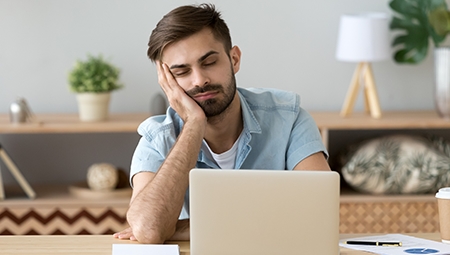
Learn about the causes of excessive sleepiness and how to improve your sleep.
By Dr. Robert Rosenberg, Medical Advisor to SoClean
Do you feel tired all the time or catch yourself dozing off throughout the day? Sleeping too much—or sleeping too little—can not only pose an inconvenience to your daily routine, but a threat to your long-term health. Learn more about why you sleep, how to tell if you’re sleeping too much, the reasons behind excessive sleepiness, and most importantly, how to improve your sleep quality.
Why Do I Sleep?
Sleep is the way our bodies recharge, just like a battery. Sleep allows our brains to keep functioning effectively and our bodies to fight off infections.[1] Our bodies work on a 24-hour clock, called a circadian rhythm, which prompts us to get tired at the end of the day and wake up feeling alert through the natural release of hormones in our body.[2] It’s important to listen to the cues your body gives you around tiredness and create consistency around your sleep habits.
The amount of sleep you need changes throughout your life.[3] As children, humans need anywhere from 9-12 hours of sleep per day.[4] As you age, that time reduces—adults typically need around seven to nine hours of sleep each night. Getting enough sleep is important for proper cognitive and behavioral functions, as well as overall health.[5] Without enough sleep, over time, people are susceptible to health issues like obesity, diabetes, and heart disease.[6]
Symptoms of Hypersomnia
Hypersomnia, or excessive daytime sleepiness, is a condition where patients feel extremely tired during the day.[7] If you feel drowsy all the time, have trouble focusing due to tiredness, or find yourself falling asleep during the day, you may be experiencing the symptoms of hypersomnia. Excessive sleeping is linked to health problems like diabetes and heart disease, which is why it’s important to address the root cause of your overtiredness.[8]
Reasons Why You May Be Sleepy All The Time
- Eating too little. If you sometimes skip meals or just opt for snacks, you may not be eating enough calories to give you the energy you need. Making sure to eat a healthy, balanced diet can put you on the right track to feeling better. Keep nuts or protein bars on hand for easy, on-the-go energy boosting options.
- Vitamin deficiency. Overtiredness can be a result of vitamin D, vitamin B-12, iron, magnesium, or potassium deficiencies.[9] Talk to a doctor to see what supplements could make sense for you.
- Stress. When the body is stressed, it produces an excess of certain hormones—things like adrenaline and cortisol—that put your body on high alert. Under chronic stress, the body becomes exhausted and fatigued as a result of this. In addition to making you feel overtired, you may experience headaches or stomach problems. Unfortunately, chronic stress can prevent you from getting good quality sleep, despite the constant feelings of fatigue.[10]
- Sleep disorders. Check with your doctor, because you may have a sleep disorder like sleep apnea that is preventing you from experiencing deep sleep. Investing in sleep equipment can help manage the effects of these types of conditions.
- Lack of (good) sleep. The quality of your sleep is just as important as the quantity of sleep.[11] Practicing good sleep hygiene can help you enter a deep sleep, which means you’ll feel less drowsy the next day.
Improving Sleep Quality
Achieving improved sleep quality is key to living a healthy lifestyle and feeling energized and alert for the day. Practicing good “sleep hygiene,” or simple steps to help your body shut down each evening, is a healthy habit to improve your sleep quality.
- No multi-tasking in bed. Beds should be used for two things only: sleep and sex. Avoid lingering in your bed on your phone or laptop. Over time, your body will build an association that when you’re in the bed, it’s time to sleep.
- Leave electronics at the door. Avoiding excess light or distractions from your phone is a good way to keep your brain focused on falling asleep.[12]
- Avoid caffeine. Even if you’re only having a cup or two of coffee, the effects of the caffeine can linger in your system and keep your body alert.[13] Try cutting out caffeine for a few weeks to see if you notice a positive effect.
- Follow a routine. Adhering to a consistent sleep schedule with wind-down rituals can help your body identify its signals to sleep.[14] Try to get up at the same time every day (even on weekends) to build up a sleep rhythm.
Managing Excessive Sleepiness
Hypersomnia and sleep deprivation can lead to falling asleep during the day or experiencing extreme drowsiness that interrupts your life. While it can be challenging to navigate, many of my patients have successfully managed these symptoms. By addressing the root causes of sleepiness and taking steps to improve your sleep hygiene, you’re well on your way to a better sleep routine and a healthier lifestyle. Improving your sleep patterns is always worth it—for your health, comfort, and peace of mind.
Resources:
[1] National Institute of Neurological Disorders
[2] National Institute of General Medical Sciences
[6] Institute of Medicine (US) Committee on Sleep Medicine and Research
[7] National Institute of Neurological Disorders
[10] Journal of Family & Community Medicine
[11] National Sleep Foundation




